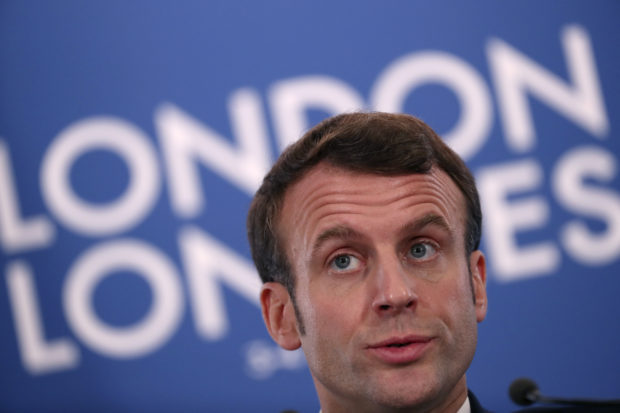PARIS – West African leaders need to make it clear they want and need France’s military presence, French President Emmanuel Macron said Wednesday, just days after a helicopter collision killed 13 French soldiers fighting Islamic extremists in Mali last week.

French President Emmanuel Macron speaks during a media conference at the conclusion of a NATO leaders meeting at The Grove hotel and resort in Watford, Hertfordshire, England, Wednesday, Dec. 4, 2019. NATO Secretary-General Jens Stoltenberg rejected Wednesday French criticism that the military alliance is suffering from brain death, and insisted that the organization is adapting to modern challenges. (AP Photo/Francisco Seco)
France will organize a Dec. 16 summit to discuss the issue with Mali, Burkina Faso, Chad, Niger and Mauritania, countries that contribute to a regional counterterror force, Macron said.
“Do they want our presence, do they need us? I want clear answers on this,” Macron said, adding that such a statement is a condition for keeping French troops there.
After the crash, which marked France’s highest military death toll in decades, Macron called for rethinking the country’s involvement, and he called Wednesday for a new “framework and political conditions” for the mission. He said France is not militarily involved in West Africa’s arid Sahel region for colonial, imperialist or economic reasons. “We’re there for the security of the region, and our own security,” he said.
The French military operation enjoys broad support in France, which has suffered repeated, deadly attacks by Islamic State extremists. The Islamic State in the Greater Sahara claimed responsibility for the helicopter crash without offering evidence.
The helicopter crash deaths have drawn new attention to a worrying front in the global fight against extremism, one in which France and local countries have pleaded for more support. In a surge of violence in recent weeks, attackers often linked to the Islamic State have killed scores of troops in the Sahel region.
Some in Mali, a former colony of France, have protested the country’s military presence. In addition to lingering resentment from the colonial past, some of the animosity stems from the growing violence.
France’s operation in West and Central Africa is its largest overseas military mission, with 4,500 personnel. France intervened in Mali in 2013 after extremists seized control of major towns in the north and implemented a harsh version of Islamic law. France’s involvement forced the extremists back into the desert, where they have regrouped and moved south into more populated areas.